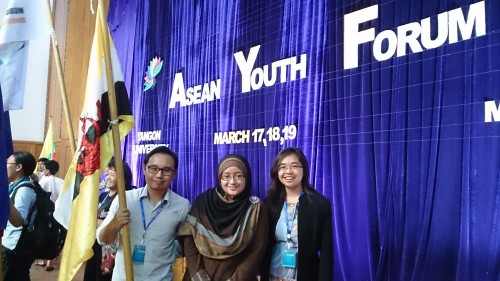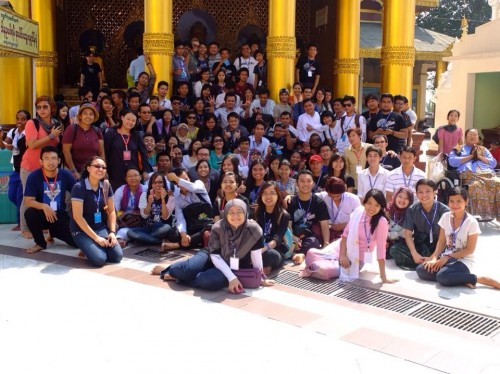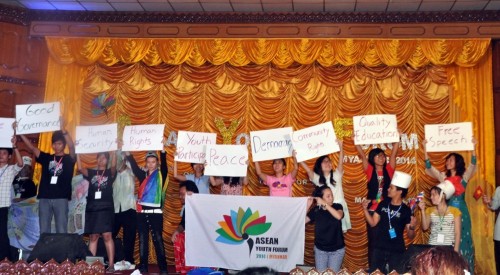1st April 2014 Bandar Seri Begawan, Brunei
6th ASEAN Youth Forum and ASEAN People’s Forum
Our guest blogger today is Khairunnisa Ashari, who is the Head of International Relations, Brunei Youth Council. Recently, two other colleagues, Faizul H. Ibrahim and Rachel Lai were selected to attend the 6th ASEAN Youth Forum and ASEAN People’s Forum with her and this is what she has to say about their trips to Myanmar.
As the focal point for the ASEAN Youth Forum, the Brunei Youth Council was responsible to select participants from Brunei to attend the 6th ASEAN Youth Forum which was held in Yangon, Myanmar from 16th to 19th March 2014. The ASEAN Youth Forum has served as a platform for youth empowerment and engagement across Southeast Asia since its induction in 2009. In addition, the forum aims to provide an avenue for young representatives to identify and define issues, challenges, strategies and the realities faced by their communities. It is hoped that this exposure will influence greater youth participation in regional and national policy making processes.
We would like to thank the British High Commission for giving us the opportunity to participate in the forums, and for their generous sponsorships. The Brunei youth delegation was led by me, through the Brunei Youth Council. The Brunei Youth Council was able to offer the opportunity to two other youths through open applications, and the seats were taken by Faizul H. Ibrahim and Rachel Lai, university students who are active in youth programmes locally and abroad.

6th ASEAN Youth Forum
The opening ceremony of the 6th ASEAN Youth Forum was held on 17th March at the Yangon University which is the oldest and most prestigious university in Myanmar. Amongst the speakers for the opening ceremony were Min Ko Naing, the 88 generation leader, who urged participants to create a society valuing human rights, democracy and education, as well as Thet Swe Win, the President of the National Youth Congress, Union of Myanmar. Notably, the AYF was also endorsed by President Thein Sein who recognized the role of young people in assisting economic and social affairs through collaborative efforts amongst ASEAN countries with different cultures.
This was then followed by a panel discussion which consisted of Mr. Bo Bo from the National Youth Congress, Madam Khin Ohmar from the Taskforce for ASEAN Burma (TFAB) and Mr Joel Mark Barredo from the ASEAN Youth Movement while I was the forum moderator.
In the afternoon, the participants were divided into 7 workshops. The Brunei team each facilitated and attended different workshops in accordance to their background or training. I facilitated the “Quality Education for Southeast Asian Youth” workshop and Faizul facilitated the “Peace and Reconciliation” workshop, while Rachel participated in the “Sexual Reproductive Health and Rights” workshop.
The second day kickstarted with Ms Benjaporn In-ngam from Thailand playing an awareness video about the ASEAN Youth Movement which highlighted the challenges faced, bringing about greater realization that youths should be empowered to bring about greater changes in the region.
Later, Mr. Bo Bo introduced the roles of the National Youth Congress and also discussed agendas from their recent Myanmar Youth Forum and Yangon Youth Forum. This opened discussions regarding the similar challenges faced by the Southeast Asian youths in their respective communities.
Ms. Morentalisa Hutapea who is the Southeast Asia Advocacy and Research Officer for Extractive Industries Program, Institute for Essential Services Reform from Indonesia introduced the ASEAN Economic Community and its significance to the youth. In spite of the two blackouts during the presentation, it did not deter the discussions which highlighted the dedication of everyone towards the cause.
Following the presentations, the delegates were then divided into three groups, which were 1) Long Term Regional and National Youth Strategies 2) ASEAN People’s Forum Strategies and 3) ASEAN Level Strategies. The Brunei team decided to join the “Long Term Regional and National Youth Strategies” group, where we designed several strategic plans for Brunei.
After a short country presentation, the ‘National and Regional Strategic Plans’ members regrouped in the evening where we worked on a regional strategic plan. The outcome was ambitious yet very realistic and our main goal was to institutionalize the existing youth regional network: the ASEAN Youth Movement. This caters to our specific objectives which were to strengthen the regional networks, to create capacity building, to review the ASEAN Youth Charter (2009) and to review the ASEAN Community Blueprint.
The final day of the ASEAN Youth Forum was dedicated towards sharing the outcomes from the three strategic groups in a mass plenary session. Delegates were encouraged to address their opinions and concerns as this was important for the finalization of the Yangon Youth Declaration. We also identified the importance of lobbying the said declaration during the upcoming ASEAN Peoples’ Forum to ensure commitment of everyone in realizing the plans and strategies.

Excursion day and the ASEAN Youth Concert
After an intense first 3 days of brainstorming for strategies and recommendations, the AYF Committee organized a day-tour to Myanmar’s landmarks and historical places including Shwedagon Pagoda, historical tombstones of Burma’s last queen, Suphayalat, Aung San’s widow, Daw Khin Kyi, famous writer Thakin Kodaw Hmaing and former UN Secretary-General U Thant. The participants also had the opportunity to go to the National Races Village and National Museum of Myanmar.
In the evening, the participants were invited to attend the ASEAN Youth Concert which was organised in conjunction with the Closing Ceremony of the ASEAN Youth Forum. This was an open event for youth groups and networks throughout Myanmar to demonstrate the concern of youths with the unity of voices through singing and performances.

ASEAN Civil Society Conference / ASEAN People’s Forum
The opening ceremony for the ASEAN Civil Society Conference/ASEAN People’s Forum was held at the Myanmar Convention Center with more than 3,000 delegates from civil society, peoples’ and grassroots organisations and individuals from Myanmar, the ASEAN region and beyond. This year marked the largest gathering of ACSC/APF since its inception in 2005, inviting participants and observers from regional and international organisations.
The Opening Speech was delivered by Dr May May Pyone, Chair of the ACSC/APF 2014 Steering Committee, followed by speeches from H.E. U Aung Min, Union Minister of Ministry of President Office, who delivered a Congratulatory Message from H.E. President U Thein Sein; U Tin Oo, Patron of the National League for Democracy, on behalf of Daw Aung San Suu Kyi; and His Excellency AKP Mochtan, Deputy Secretary-General of ASEAN for Community and Corporate Affairs who delivered the Keynote Speech.
The Forum featured four Plenary Sessions and 35 parallel Workshops covering the topics of peace, justice and human rights, development and democratisation. There were also side events such as exhibition, film screenings, and handicraft shows, representing the faces and voices of the peoples and community of ASEAN.
In the afternoon of the second day, youth representatives from each country were invited to attend dialogue at the Myanmar Peace Centre with His Excellency Aung Min, the incumbent Minister of the President’s Office of Myanmar. Few members of the Myanmar Peace Centre gave briefings about their work and also the challenges they have faced during the peace and reconciliation process. For the next hour and a half, the session was dedicated to Q&A between the participants of AYF with the Union Minister.
The third day focused on finalising the Conference Statement to be presented to the ASEAN Member States in the upcoming 24th ASEAN Summit. The conference concluded with a handover ceremony to the next host of ACSC/APF 2015: Malaysia.
As a follow up, the delegates are expected to work on their own respective national processes to implement the national and regional strategies discussed during the workshops. It is hoped that starting this year youth from different Southeast Asian countries can work together towards empowering other youths to be involved in national development as well as establishing a stronger regional network.